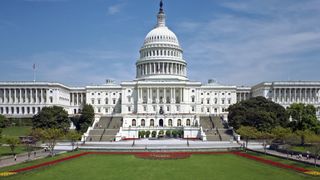Moffett to Hill: Beware Cord-Switching Bubble

While most eyes were fixed on another Hill hearing Thursday (Sept. 27), members of the House Energy & Commerce Committee Communications Subcommittee were preparing to get a sobering view of the vaunted cord-cutting, OTT-driven new media marketplace.
Craig Moffett of MoffettNathanson Research was among a trio of witnesses for the hearing, and according to his prepared testimony, the current business model for over-the-top video is more like a bubble that could ultimately burst, or at least deflate.
Moffett told the committee that while virtual MVPDs like Sling and YouTube TV and DirecTV Now are billed as all about more consumer control and a step closer to the "nirvana" of a la carte, their real appeal is simpler. They cost less, say $40 versus a cable bundle at $100 per month.
Related: Study: Streaming is a Supplement, Not a Replacement for Traditional TV
But the problem with cord cutting, which he suggested was a bit of a misnomer since it is really cord-shifting, is that programming doesn't cost less to produce just because it comes over the top, nor is it cheaper for the aggregator of those channels to buy it, and often it costs more because they are smaller and have less clout.
Both traditional and OTT, in most cases, also generally involve a set-top. So when a cheaper alternative is cheaper for no technology or business reason, beware, he said.
Generally, virtual MVPDs are cheaper because they offer fewer networks, but also, because the services are being sold at a loss. He estimates that the content on YouTube TV and DirecTV Now costs $40 and it is being sold at $40, so with added costs of billing and marketing and others, the service is losing money.
Multichannel Newsletter
The smarter way to stay on top of the multichannel video marketplace. Sign up below.
"There’s an old saying among economists that when something is unsustainable, it will eventually stop," he said.
"Selling a service for a loss isn’t sustainable, even allowing for the fact that companies like Google (owners of YouTube TV) believe the path to monetizing video is not by selling the service to consumers for more than it costs but instead by trying to sell advertising against it," he said.
As for traditional media having to compete with those new offering, he said, "It has been widely observed that many of the changes in media are about trying to keep pace with Google and Facebook. It will be very hard for traditional distributors to compete with a service provider that is willing to lose money on selling the service."
As the saying goes, something's gotta give.
Moffett said there are two outcomes, either Google and Facebook will dominate with a targeted advertising model, or vMVPDs will have to raise their prices and the distinction between new and old models won't look so significant.
As to the vaunted figure of 500 new scripted series in production being a 50% increase in the past few years. "To state the obvious, viewership has not grown by anything like 50 percent. Indeed, viewership of traditional video is declining as traditional media increasingly competes with social media and non-traditional forms of digital video. Massively increasing supply while demand is falling is no more sustainable than an aggregation model that doesn’t make money."
The video bubble he talked about was not necessarily about valuations, but about changing the economics of the media, the natural consequence has not been seen yet, "but it will." Those, he said, will be higher prices and the production of less "top shelf" content.
Moffett also said the new media model is exclusivity, or what he called "closed media systems."
For example, he said, the Department of Justice was fighting the last war in challenging the AT&T/Time Warner deal over exclusivity issues.
"The age of Closed Media is coming irrespective of what happens in the DOJ’s appeal of [the] decision," he said. “Netflix, Amazon, and Hulu have already created their own closed systems. Disney has announced plans to go direct to consumers. HBO is already on the same path. All will be closed systems....And now we have Comcast’s acquisition of Sky in Europe. The very premise of the deal is content exclusivity, and the bid to create a closed system to rival Netflix."
Contributing editor John Eggerton has been an editor and/or writer on media regulation, legislation and policy for over four decades, including covering the FCC, FTC, Congress, the major media trade associations, and the federal courts. In addition to Multichannel News and Broadcasting + Cable, his work has appeared in Radio World, TV Technology, TV Fax, This Week in Consumer Electronics, Variety and the Encyclopedia Britannica.

